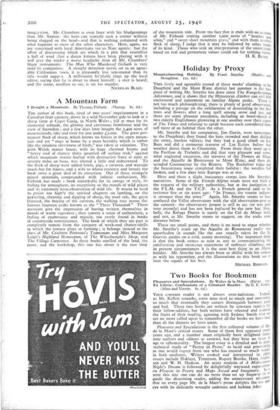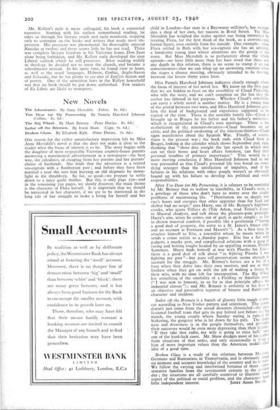Two Books for Bookmen
YOUR constant reader is not always over-judicious. Indein, as Mr. Kellett remarks, some men read so much and remember so much that eventually they cannot distinguish between good and bad. These two books are written by constant readers for their fellow-addicts, but both writers have selected and orders{ the fruits of their reading, agreeing with Sydney Smith that at are no more called upon to remember all the books we have read than all the dinners we have eaten.
Pleasures and Speculations is the first collected volume of Mr. de la Mare's critical essays. Some of them first appeared many years ago, and a number must originally have delighted fortu- nate authors and editors as reviews, but they bear no trace of age or ephemerality. The longest essay is a detailed and in pa,rts technical study of " Poetry in Prose," as lucid and penetratulg as one would expect from one who has created so much beauty in both mediums. Writers evoked and interpreted in other essays include Hakluyt, Tennyson, Rupert Brooke, Hans Ander- sen and W. H. Hudson. An acute analysis of A Midstannie Night's Dream is followed by delightfully wayward expatiations on Flowers in Poetry and Maps Actual and Imaginary. In 3 note this size one can do no more than set up finger-pests 113 guide the discerning reader, adding the unnecessary assurance that on every page Mr. de la Mare's prose delights the ear and eye with its delicately wrought cadences and lurking jokes.
Mr. Kellett's style is more colloquial, his book a connected narrative. Starting with his earliest remembered reading, he takes us through his literary youth and early manhood, stopping only to comment on the books and writers that made most im- pression. His precocity was phenomenal (he thoroughly enjoyed Rasselas at twelve) and there seems little he has not read. There was complete literary freedom in his Victorian home, Don 7uan alone being forbidden, and Mr. Kellen early developed the easy Liberal outlook which he still possesses. After reading widely in theology, he decided not to enter the church, and became a schoolmaster instead. In his spare time, he found time to learn, as well as the usual languages, Hebrew, Gothic, Anglo-Saxon and Icelandic, but he has plenty to say also of English fiction and of poetry. One of the unwritten laws in the Kellett household was that no book should be put down unfinished. Few readers of Ex Libris are likely to transgress.































 Previous page
Previous page